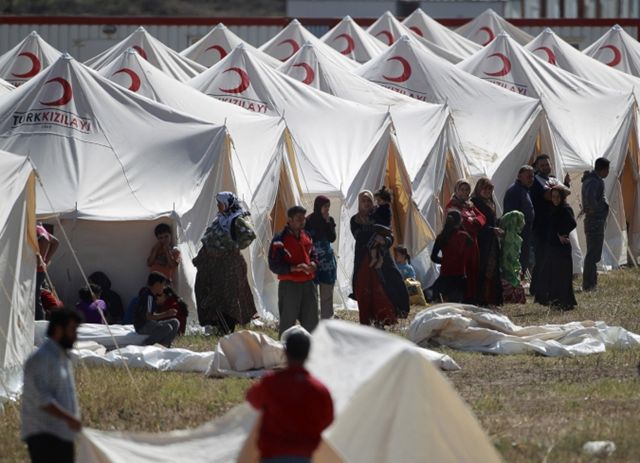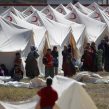
Turkey Anxiously Weighs Cost of Escalation with Syria
Publication: Terrorism Monitor Volume: 9 Issue: 42
By:

After a long thaw, Turkish-Syrian relations reached new heights in 2009 as Prime Minister Recep Tayyip Erdogan of Turkey and Syrian President Bashar al-Assad initiated a new phase in bilateral relations. In September of that year, visa restrictions were lifted and cross-border trade flourished. High-level meetings produced the Turkish-Syrian Strategic Cooperation Council Agreement a month later. The agreement institutionalized direct contact for the first time, resulting in a cascade of treaties. Joint cabinet meetings and military exercises were held that year and in 2010. The significance of these developments remain hard to overstate; after decades of Cold War feuding and tensions that nearly produced war twice, Turkey and Syria began working towards a friendlier, more prosperous future. That future, however, is now in doubt, as goodwill began evaporating once Assad unleashed his forces on democratic protesters last March.
Turkish leaders initially tried to convert years of diplomacy into a peaceful solution. Erdogan phoned Assad repeatedly. He then blamed Bashar’s brother, Maher, for pursuing the crackdown, apparently hoping that Bashar would distance himself from the regime’s hard-core and stop the violence (Today’s Zaman, June 10). A pro-Assad mob responded by attacking the Turkish Embassy in Damascus on June 13. Syrian officials accused Turkey of taking orders from Washington. Meanwhile, Turkey allowed the Syrian opposition to organize in Istanbul as diplomatic efforts continued.
Turkey’s ambassador to Syria visited the devastated city of Hama in August. The next day Erdogan announced a diplomatic breakthrough was imminent. “Our ambassador went to Hama and said that the tanks, security forces had started to leave Hama. This is highly important to show that our initiatives had positive results.” Erdogan added that Assad’s promised reforms would come within days (AFP, August 10). However, no reforms were instituted and the violence worsened. Turkish-Syrian relations deteriorated even further and according to remarks made by Erdogan in September, contacts were suspended, thus voiding the diplomatic gains of 2009. Most recently, Turkey’s embassy and consulates came under attack again on November 12, leading the Syrian Foreign Minister to apologize, and his Turkish counterpart to meet with the Syrian opposition. As of today, Turkey’s posture is hostile but restrained.
After Syria’s state-run media claimed refugee camps in Turkey were “centers of isolation full of rape and torture,” Erdogan pledged to visit the camps and threatened to impose unilateral sanctions on Syria (Hurriyet, September 21; al-Arabiya, October 21). In late October, Turkey’s Foreign Ministry went a step further and arranged for reporters to meet Colonel Riyad Musa al-Asa’d, a Syrian defector and commander of the Free Syrian Army who organizes resistance from Turkish territory (see Terrorism Monitor Brief, October 14). Erdogan’s rhetoric shifted dramatically during this period as he began referring to the Syrian opposition as the “glorious resistance” (Today’s Zaman, November 1). In September, Erdogan warned Assad that the “era of repressive regimes has ended” (al-Jazeera, September 17). Turkish media took an anti-Syrian bent, matching Erdogan’s tone. New terrorist attacks by Kurdish separatists of the Partiya Karkeren Kurdistan (PKK) have further complicated tensions; with many in Turkey blaming Syria and Iran for the recent violence they believe is retaliation for Turkey’s tough stance.
Turkey’s Syria policy, however, remains tempered by apprehension – the country’s inaction certainly proves this. Erdogan’s populist streak guarantees he will condemn Assad’s brutality, but, after revealing the presence of Syrian rebels in Turkey, the Turkish Foreign Ministry has curbed its bravado. Regardless of threats made months ago, Turkey still has not sanctioned Syria, most likely because Turkey’s business elite stands to lose too. Perhaps most conspicuous of all, Erdogan never fulfilled his promise to visit the refugee camps. Indeed, action remains elusive as officials calculate the cost of escalation. Should Turkey encourage regime change, officials know Syria and Iran – Assad’s only ally – could strike back by supporting the PKK.
Military confrontation remains unlikely although relations are reaching new lows. Striking the PKK would require action in Iraq rather than Syria; and attacking Assad for his encouragement of Kurdish terrorists would risk an all-out war, for which there is no popular support in Turkey. After some debate, it appears Turkey is no longer considering the creation of a humanitarian buffer zone in Syrian territory either. Turkey’s foreign minister, Ahmet Davutoglu, admitted last month that military options were on the table but invasion was not an option (Hurriyet, October 7). Erdogan and the military are also sending different signals. In August, Erdogan referred to Syria as Turkey’s “internal problem” (Milliyet, October 31). Last month, however, Turkey’s Chief of Staff, General Necdet Ozel, disagreed during a television interview, arguing that Syrian unrest was “primarily the internal problem of that country” (Milliyet, October 31).
The prospect of terrorism, the complicated nature of military solutions, and unrealized threats combine to suggest the cost of escalation is still too high for Turkey’s leaders. Condemnations will continue but the tipping point could be months away. The problem for Turkey is that it remains the only neighbor with any leverage; the country enjoys economic ties with Syria, which it could sever, and previous good relations, which it could revive. Other countries will consequently push Turkey towards decisive action, but with military operations being the least likely outcome for now.
Matthew M. Reed is a Middle East specialist at Foreign Reports, Inc., a consulting firm in Washington, DC. More of his commentary can be found at Al Ajnabee, where he writes about the Middle East and U.S. foreign policy. He completed his M.A. coursework at George Washington University in May 2011. The views expressed here are solely his.





